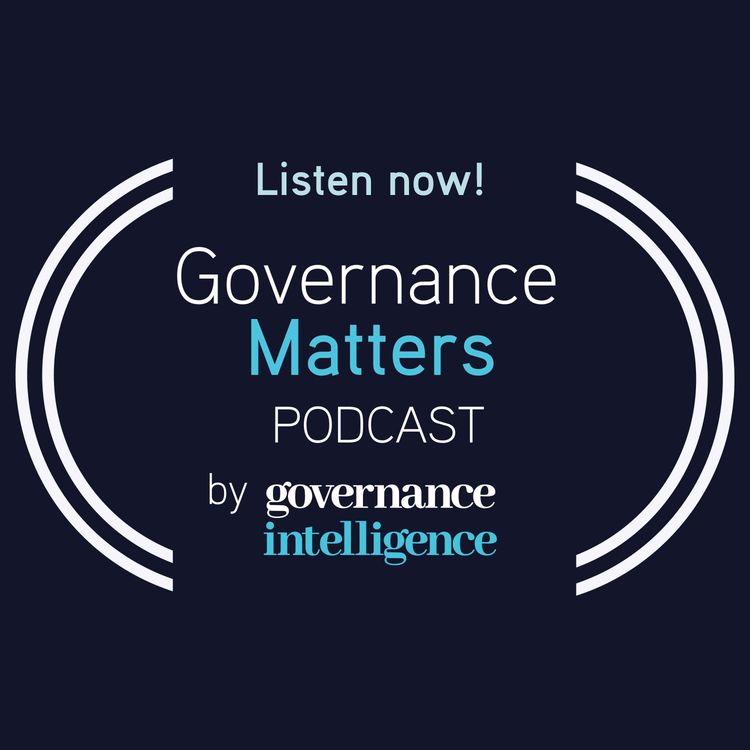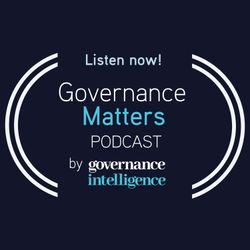Share

More episodes
View all episodes

2026 proxy season: What’s about to change and why it matters
19:25|The team breaks down the changes poised to redefine boardrooms and investor influence next year On the latest episode of the Governance Matters podcast, editor Laurie Havelock is joined by senior reporter Natalie Bannerman to discuss all the latest goings on from the world of GRC. ISS has unveiled its 2026 benchmark policy updates, ushering in a greater focus on that transparency and accountability across all jurisdictions. At the same time, the SEC’s 2026 exam priorities spotlight data privacy and – for the first time in years –exclude cryptocurrencies, signalling a softer stance on the asset. Also, fresh on the heels of the Corporate Governance Forum in New York, we share some of the key taking points from inside the room and how it interplays with the changes across the space.
Best in class: tips on crafting your proxy statement from a previous award-winner
20:15|On the latest episode of the Governance Matters podcast we’re joined by Paul Sharobeem, associate general counsel and assistant secretary at Century Aluminum Company. He tells Natalie Bannerman about what it meant to him and his team to win the award for Best Proxy Statement (small cap) in 2024, ahead of this year’s Corporate Governance Awards ceremony in November. We also discuss the importance of balancing narrative with regulatory compliance in corporate reporting, the challenges Century Aluminum is facing in the current climate and some top tips for those wanting to craft an award-winning proxy for themselves.
Introducing Governance Intelligence's new summer signing, Natalie Bannerman
18:25|This month on the Governance Matters podcast, we're proud to unveil the latest addition to our team: Natalie Bannerman, who is taking on the mantle of senior reporter. A former telecoms and infrastructure journalist, a role she held for nearly seven year, Natalie also worked in the B2C startup space, covering lifestyle, arts and culture reporting. She speaks to us about her current projects, what she has made of 2025's busy proxy season and what she is looking forward to covering in the world of governance, risk and compliance.There's also more information about the nomination process for the upcoming Corporate Governance Awards, with the deadline for entries falling later this week. To submit your entry to the awards, find the entry form here.
How much can AI help lawyers carry out their jobs?
30:08|How much can lawyers lean on AI to help them with their jobs? Well, according to a new academic study, it may be more reliable than previously thought.A new study from researchers at the University of Minnesota and University of Michigan law schools seems to provide the first empirical evidence that AI tools can consistently improve the quality of legal analysis across various tasks.We speak with Daniel Schwarcz, professor at the University of Minnesota Law School, and Kari Endries, assistant secretary and managing counsel at Chevron, to find out more about the implications for governance professionals.To read the whole paper, click here: https://papers.ssrn.com/sol3/papers.cfm?abstract_id=5162111
How will the SEC’s shift on shareholder proposals affect the proxy season?
21:36|Many governance experts involved in the shareholder proposal process are asking questions following the release of new SEC guidance that essentially reverses a Biden-era staff legal bulletin (SLB) on the parameters and reasoning by which companies may seek the go-ahead to exclude resolutions from their proxy statements.Overall, the division of corporation finance’s move will likely lead to fewer ESG-related proposals making their way to a vote at AGMs, posing questions about what happens this year and how proponents will respond in the future.Many experts are waiting to see what happens in the short term given that the guidance arrived at a time when many companies have already received a 14a-8 verdict for their 2025 AGM under the old guidance while others are awaiting a response from the SEC under the newly issued SLB. Others could still file no-action requests.In the latest episode of our Governance Matters podcast, we hear from Beth Sasfai, partner in Cooley’s public companies group and leader of the law firm’s ESG and sustainability advisory practice. Among other things, Sasfai is an expert adviser to companies on shareholder proposals. She shares her thoughts on the potential impact of the new guidance for companies and proponents this proxy season and beyond.
Perks of the job: Be wary of how you disclose them in 2025
22:15|Executive compensation has been a focus for the SEC in recent years, with new rules in areas such as clawbacks and insider trading. The agency has also turned its enforcement eye to companies’ disclosures around executive perquisites, or perks.Our guest for this month’s episode of the Governance Matters podcast is Neil McCarthy, co-founder and chief product officer of DragonGC. He says there has been a particular enforcement focus on executives’ use of aircraft. He also explains that there is a growing focus among companies on how to report – or not report – on personal security expenses for executives, a concern sparked in part by the murder last year of UnitedHealthcare CEO Brian Thompson.To take part in Governance Intelligence's online survey about succession planning, please click here or visit https://emea.focusvision.com/survey/selfserve/21d9/240801
Meet the Corporate Governance Awards winners – part three: Helle Bank Jorgensen
38:45|When Governance Intelligence presented its 17th annual Corporate Governance Awards recently, Helle Bank Jorgensen, founder and CEO of Competent Boards, received the lifetime achievement award.In a series of episodes of the Governance Matters podcast we have been talking to some of the Corporate Governance Awards winners about the efforts behind their success and challenges they see in the coming year. In this episode we hear from Jorgensen about her work in the field of governance and sustainable business practices, including her thoughts on anti-ESG efforts and the role of boards in terms of their companies’ ESG programs.Governance Intelligence also talks to Nicolas Leroux, CEO of Odyssey by Kalexius. Every year brings both evolving and unique challenges to those working in entity management, and 2025 certainly looks set to be no different.Click to listen and subscribe on Apple podcasts, Spotify and Acast.This month’s episode is brought to you in partnership with Odyssey by Kalexius.
Meet the Corporate Governance Awards winners – part two: Nasdaq
19:39|Governance Intelligence recently presented our 17th annual Corporate Governance Awards at a gala event in New York, where a few hundred of the best and brightest in the profession got to let their hair down while celebrating success in the field.The awards honor outstanding achievements by the profession in areas such as hosting AGMs, compliance and ethics programs, ESG reporting, entity management, use of technology, proxy statements, investor engagement and corporate transactions.In a series of episodes of our podcast Governance Matters we’re talking to some of the winners about the work that helped them land their awards and some of the challenges they see in the coming year.Nasdaq had quite the bumper evening at the awards. The company won the titles for governance team of the year (large cap), best director training and education program and best ESG reporting (large cap). It was also nominated in the best global entity management category.In this episode, I speak to Erika Moore, corporate secretary and deputy general counsel at Nasdaq, about the details of the company’s award-winning director training and education program, its first governance roadshow and her team’s successful approach.The Governance Matters podcast provides listeners with insight into cutting-edge issues of the day for corporate secretaries, general counsel and other governance professionals. The series looks at how the roles of governance professionals and the board – as well as the landscape in which they operate – are evolving.